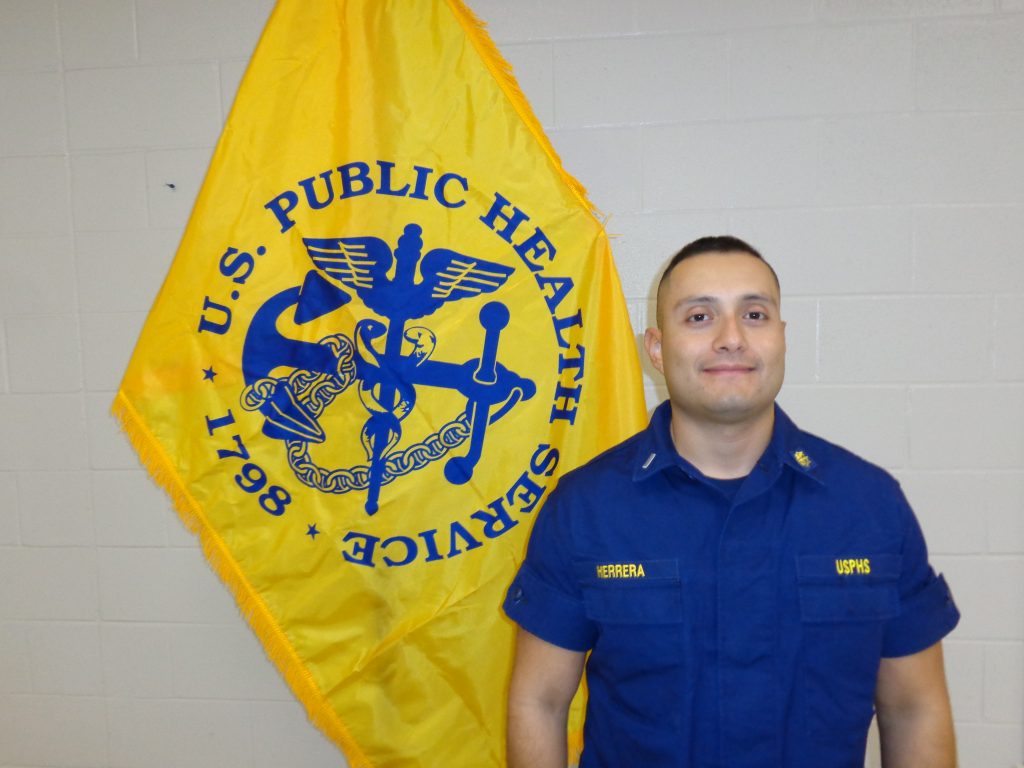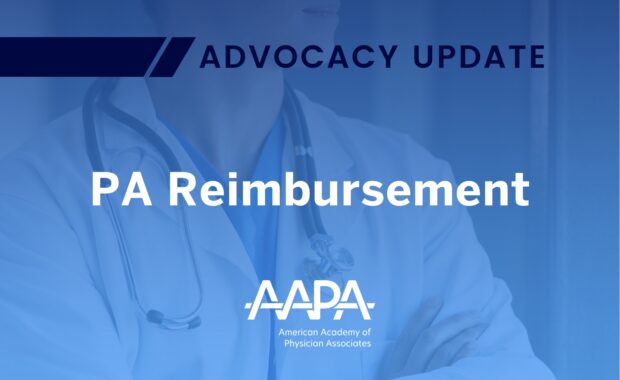I’m a PA in the U.S. Public Health Service
Why You Should Consider This Career Path Too
January 12, 2021
By Lieutenant Junior Grade German S. Herrera, MPAS, PA-C, USPHS
Lieutenant Junior Grade German S. Herrera, MPAS, PA-C, USPHS, had a love of science and a desire to help people. The United States Public Health Service – with its scholarship opportunities, benefits, and guaranteed job placement – was a perfect fit for him.
[LTJG Herrera, PA-C, and two of his USPHS colleagues hosted a webinar. Watch now!]

Becoming a PA
Since my early years of school, I have always had a deep interest in science, as well as an interest in helping others. I grew up an immigrant in the United States, and experienced firsthand the challenges underserved populations face: no access to healthcare and difficulty communicating with my providers (I was not yet fluent in English). I knew I wanted to pursue a career where I could simultaneously employ science and improve the health and wellbeing of others.
I attended the University of South Florida as an undergrad. During my time there, I developed an affinity for chemistry, so I pursued a degree in medical laboratory science. After graduation, I got a job at Tampa General Hospital as a flow cytometry medical technologist. As part of my duties, I assisted healthcare providers with collection of bone marrow biopsies for pathology and cytometry studies. Some of the providers I assisted were advanced practice providers (APPs) – my first introduction to the roles and professions. While my job was an intersection of science and improving others’ lives, I came to enjoy going to the procedures more than being in the lab. I enjoyed interacting with the patients and observing the improvement they were making as they worked with us.
After researching different professions, I decided to become a PA. I believed the PA profession would be the perfect fit for me because it contained a vigorous science foundation and allowed me to interact with and directly influence patients’ lives. Decision made, I then spent the majority of the following year completing pre-requisite courses and developing a resume to be a competitive applicant for PA school. I also participated in a medical relief brigade to a severely underserved region of Nicaragua. We provided medical aid to nearly one thousand rural patients who did not have access to medical providers locally. In Nicaragua, I discovered I not only wanted to become a PA, but that I was called to use my skills to help underserved populations who need it most.
During my research process, I found out that my alma mater, USF, had recently started a PA program. I applied and was fortunate to be accepted. I was grateful to attend school at USF because the Morsani College of Medicine emphasizes interprofessional education and focuses on developing graduates who have the competency to function cohesively in an integrated healthcare team.
The United States Public Health Service
During my first semester of PA school, I received an email from one of my instructors about a scholarship opportunity with the United States Public Health Service (USPHS) Commissioned Corps. I had never heard of USPHS, but I was interested in giving back to the community and serving the United States. I began to research and learned the extensive history of USPHS, dating back to 1798 when it originated as the U.S. Marine Hospital Service. The USPHS Commissioned Corps officers are America’s first responders and their mission is “protecting, promoting, and advancing the health and safety of the nation.” USPHS officers respond any time there are healthcare emergencies – Hurricane Katrina, the Ebola outbreak, COVID-19, etc. When officers are not deployed, USPHS provides healthcare and engineering staff, as well as other scientists, to many different federal agencies such as the Centers for Disease Control (CDC), Food and Drug Administration (FDA), and the Federal Bureau of Prisons (BOP).
[USPHS SRCOSTEP: Why Every Student Needs to Know This Alphabet Soup]
I was inspired by the mission of the Corps and applied to the Senior Commissioned Officer Student Training and Extern Program (SRCOSTEP). In the SRCOSTEP, students apply during the first year of PA school and are commissioned as uniformed service officers before the start of the clinical year. The application process is multifaceted and includes passing a medical entrance review board, undergoing several interviews, and obtaining a security clearance. Students are sponsored by a federal agency and, in my case, I was sponsored by the BOP. Being sponsored by the BOP as a SRCOSTEP meant I was guaranteed a position as a PA with the BOP upon graduation. The application took about two or three hours a week during my hectic didactic year, but I appreciated the opportunity. Not only would I be guaranteed a job, but I was creating the foundation for an impactful and rewarding career.
I was accepted into the SRCOSTEP and began to enjoy the benefits of being a commissioned officer during my clinical year of PA school. I was paid the full salary of an active-duty officer for my rotations; I received Tricare (military healthcare coverage) for my family and me; I was able to shop duty-free on military installations. I am married and have a young son, so having financial security during PA school and a guaranteed position after graduation relieved a huge burden. I was able to focus on excelling in my rotations and preparing for the PANCE without having to worry about accruing more loans, finding a job, or negotiating a benefits package.
[Wherever you want to go in your career, AAPA can help – join or renew your membership today]
First PA Job and COVID-19
I graduated in May 2020, and have been working at Coleman Federal Corrections Complex, which is 40 minutes east of Orlando, Florida, since June. I viewed this as a great opportunity to provide care to a highly underserved population, since many incarcerated people have never had appropriate access to medical care. At Coleman, I work at the penitentiary as a primary care PA. I work alongside LCDR Joshua Henderson, PA-C, USPHS, who is a senior PA at the institution. He is always available as a clinical resource and mentors me on advancing my career as a PA and a USPHS officer. We work collaboratively with an onsite physician who provides general oversight.
At Coleman, the APPs are in charge of the sick call and interim care between annual chronic care visits, which are done by the physician. On a typical day, I have a schedule of sick inmates to see for the day; however, days do not always go according to schedule! There are commonly acute injuries and complaints that require evaluation. I may be seeing an inmate for an insulin dose adjustment, when suddenly an alarm goes off and I have to rush to a housing unit to evaluate an inmate who was injured in an altercation or go evaluate another patient who has developed acute chest pain.
Due to the COVID-19 pandemic, we also created isolation and quarantine units at the institution, and I was assigned as the APP in charge of the isolation unit at the penitentiary. This allowed me to perform clinical and administrative roles because I was both performing medical assessments on these inmates to determine if they needed escalation in care, and maintaining a roster of the inmates to ensure they completed an appropriate length of isolation based on CDC guidelines. My fellow PA colleague at the institution, LCDR Henderson, implemented an effective quarantine and testing protocol based on CDC and BOP guidelines, and we were able to eliminate all COVID-19 cases at our institution and recently closed down the isolation unit. I enjoy the changes of pace and the variety of acuity levels and conditions I have the opportunity to treat working at a federal prison, as well as the ability to implement public health measures.
“A tremendous opportunity”
Commissioning as a USPHS officer, particularly through the SRCOSTEP, was a tremendous opportunity that allowed me to lay the foundation of an impactful career while still attending school. It is an honor to be a part of an organization of medical professionals who have been dedicated to protecting the public health interests of the United States and delivering medical care during critical moments for more than 200 years. In the USPHS, PAs have the ability to develop their clinical skills, but we also have the ability to develop our leadership skills and become health advocates.
Rear Admiral Elizondo Epifanio, Ph.D., PA-C, USPHS (Ret.), is a great example of what PAs can accomplish in the USPHS. He began his career as a Navy corpsman, attended PA school, then practiced as a PA with the USPHS in many settings – from federal prisons to Native American populations. He rose through the ranks and served as Assistant Surgeon General of the United States and, at the time, was the highest-ranking PA in all of the uniformed services. He is an outstanding example of the adaptability of PAs and our leadership potential. I encourage every PA or PA student who is interested in serving marginalized groups or wants to develop into a leader who promotes and advances public health in the U.S. and abroad, to consider the USPHS. You may be the next PA to reach a national leadership position and have the opportunity to influence the health of the United States at large!
Lieutenant Junior Grade German S. Herrera, MPAS, PA-C, USPHS, is a primary care PA at Coleman Federal Corrections Complex in Coleman, Florida. He can be reached at [email protected].
You May Also Like
USPHS SRCOSTEP: Why Every Student Needs to Know This Alphabet Soup
PA Like a Pro Webinar Series
AAPA Student Membership
Thank you for reading AAPA’s News Central
You have 2 articles left this month. Create a free account to read more stories, or become a member for more access to exclusive benefits! Already have an account? Log in.
